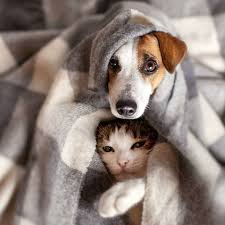

Dr Christina Snow
What is arthritis?
Arthritis is any inflammatory disease of joints. Typically when we talk about arthritis, we are talking about degenerative arthritis. Degenerative arthritis is a disease and it affects many of our pets as they age, but is not limited to the old and frail.
Degenerative joint disease is not curable; it is unfortunately a condition we need to manage. We can try to prevent further damage and relieve suffering and pain, but once changes have occurred they are not reversible.
Basic joint structure:
Arthritis is the end point of many diseases but is considered any inflammatory disease of the joints. To understand the how arthritis affects the joint, it is important to understand the joint structure.
Joints are where two bones meet. The ends of bones are covered in cartilage which acts like a cushion. They are joined to each other by ligaments and a fibrous-connective tissue called the joint capsule. The joint capsule encloses the space between the bones, which is then filled with thick and sticky fluid, synovial fluid. The fluid is thick because it also acts as a cushion for the joint. The aim is for the joint to allow the two bones to move across one another without friction.
Causes of arthritis:
In a joint everything is connected in some way, and works together in harmony. If one thing inside the joint becomes diseased, it can have effects on the whole joint as a system. Inflammation is the key first spark to any arthritis. Inflammation can be caused by:
- Trauma – this can include acute trauma like being hit by car, or fracturing a limb, or damage to a ligament or tendon (e.g. a cruciate ligament injury)
- Poor conformation and biomechanics leading to extra wear and tear – this includes all the animals with altered bones to normal, for example bow-legged, hip and elbow dysplasia, dwarf breeds, pigeon-toed etc
- Infection – more common in very young animals
- Immune system diseases – caused by overacting immune system cells (e.g. Rheumatoid arthritis in people)
Signs of arthritis:
Reluctance to take walks of normal length
Reluctance to jump up
Stiffness that may resolve once they are warmed up
Difficulty with stairs, getting in the car, onto the sofa or bed
Difficulty rising
Limping/abnormal gait
Poor grooming
Litter tray mishaps/inappropriate toileting in cats
Licking a joint
Soreness when touched
Changes in behaviour such as more sleeping, being withdrawn or less social or just grumpy, often seen to be “ageing”
Treatment options /management options:
Treatment of the underlying cause is always the most desirable path but not always possible. Certainly in the cause of a fracture, we can heal the bone. In the case of an infection, we can use antibiotics. In the case of poor conformation, some surgery or management options are available to help correct it. All of these options are designed to reduce future inflammation.
Once arthritic changes have occurred the following are options for your pet:
Weight control- When there is less weight to carry there is less stress on the joints. This will have the biggest impact on mobility and joint health than anything else.
Exercise moderation- Avoid extremes like chasing balls, playing Frisbee or lots of running. Often arthritic patients will think they can do more than they can, and pay for it later when they are feeling sore. Exercise is still important for them, but do gentle activities like walking on the lead and swimming to keep their muscle tone.
Soft bedding- Having somewhere to sleep with good padding will put less pressure on the joints. This is important when they fall asleep on their limbs but also when they get up and rise as well.
Pentosan (‘Cartrophen’) injections- Pentosan is a disease modifying osteoarthritis drug and is given as a course of 4 injections, once a week for 4 weeks. These courses are repeated every 6-12 months for life. Pentosan inhibits enzymes within the joint that cause cartilage breakdown. It also has a number of secondary benefits such as increased blood flow to the joint capsule and cartilage, preserving preoteoglycan content and stimulating hyaluronic acid synthesis.
Neutraceuticals
Omega 3’s- Fish oil has a number of useful properties. The important aspect of fish oil is the Omega 3 fatty acids, or more specially EPA and DHA. These molecules help to reduce inflammation in the body, including the joints. They are best given as a supplement in the diet and can be given from human pharmacy products or mixed already into dog and cat foods such as Hills J/D Joint care range.
Glucosamine and Chondroitin- These supplements have less evidence of truly causing less signs of arthritis in patients, but are certainly not harmful at the right dose. They are thought to work through providing additional building blocks to healthy joint cartilage, making sure the joint has everything it needs.
For fish oil, glucosamine and chondroitin dosing for your pet, call us and speak to a Vet or Nurse to make sure it is correct.
Massage, physical therapy and acupuncture- Many of our patients love massage and it can really help their day-to-day mobility. Talk to us about options to do at home and suitable services in the greater Glenelg community for this.
Pain relief- Ultimately arthritis is painful condition and we will be happy to help your pet with options for this. Depending on the patient’s health otherwise different medications or combinations of medications may be suitable. We also take regular blood tests for patients on long term medications to make sure they stay healthy on the inside.
Some commonly used options include:
Non steroidal anti-inflammatories – This is a group of medications that all act in a similar way, reducing inflammation, swelling and pain. These include meloxicam (“Metacam”), carprofen (“Rimadyl” and, firocoxib (“Previcox”) amongst others.
Tramadol – a synthetic opioid that reduces the transmission of pain from the joint to the brain.
Gabapentin – to reduce the chronic stimulation of the nervous system that feels the pain.
Does your pet spend most of his or her time outdoors? Encourage more time inside where possible, especially at night. Appropriate weather-proof housing is essential if it is not possible to have your pet indoors.
What sort of breed of dog/cat do you have and how long is their coat? Naturally certain breeds are going to be more resilient to cold weather. For example arctic dog breeds i.e. Husky, Samoyed, Japanese Akita will be much more tolerant of the cold than short haired dogs such as whippets and greyhounds due to their coat length and genetics. It is therefore important to take into consideration the breed of animal you have, you may need to help your fury friend out by investing in a coat or jacket for them, after all Jack Frost can be pretty unforgiving!
Are you feeding your pet appropriately for winter? Good nutrition is essential for staying healthy and warm during winter. Outdoor animals need to eat slightly more during winter because it takes more energy to stay warm when it’s cold!
Indoor pets however have different dietary requirements. If your pet generally snoozes away the cold days you may need to slightly reduce his/her intake. Animals spend more time sleeping during winter to conserve energy.
Are you meeting your pet’s exercise requirements during winter? Although it’s tempting to huddle on the couch with your pet when the weather gets chilly, it is still important to keep up with daily exercise. A good run at the park is a perfect way to warm up, for both you and your pet.
It is important though to be aware of signs of deteriorating mobility during the cold weather, this can be a clue that your pet may be suffering from arthritis, which is often exacerbated in winter. If this is the case, low impact exercise such as short on-lead walks are recommended.
If you believe your pet is in pain, or simply not coping with winter, please give us a call at Glenelg Vet for further advice.
Glenelg Vet
597 Anzac Highway, Glenelg
South Australia 5045
Ph: 08 82951312
fax: 08 8376 4866
e: info@glenelgvet.com.au
Opening Hours
Monday-Friday 8.00am - 6.30pm
Saturday 9.00am - 2.00pm
